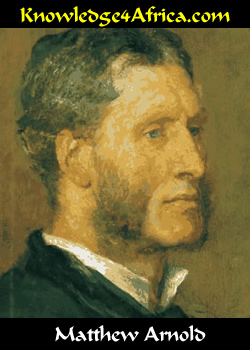|
READ THIS
"Dover Beach" was written in 1867 and paints a picture of what has been described as a
"nightmarish world" from which the once powerful forces of Christianity has withdrawn.
The poet was looking over the English Channel from the cliffs at Dover and listening to the sad sound of
the waves rushing in over the pebble beach below.
The sound, he said, was described by the ancient Greeks as a reminder of human misery. It was also
like the "Sea of Faith" which was now ebbing after nearly two millennia of expansion.
The poet called on his loved one to remain firm or else it would be difficult to stay faithful to truth in the
troubled world where there are never-ending rumours of war.
 ABOUT THE POET
ABOUT THE POET
Matthew Arnold was born in December 1822, the son of the headmaster of the now famous Rugby
School.
He was initially tutored at Rugby but, in 1841, began studying at Oxford University where he graduated
in 1844.
He started teaching at Rugby but, in 1847, became Private Secretary to Lord Lansdowne who was Lord
President of the Council. It was then that he published his first book of poetry.
Arnold soon took up a position as an inspector of schools and, because of the increased salary, almost
immediately married Frances Wightman with whom he had six children.
He was elected Professor of Poetry at Oxford in 1857 and was apparently the first man to deliver his
lectures in English instead of Latin.
In 1883 and 1884, he toured the United States where he delivered lectures on education and democracy.
He retired from school inspection in 1886 but, just two years later, he suffered a heart attack and died.
He was then 66 years of age.
Arnold is heralded today -- along with Tennyson and Browning -- as one of the great Victorian poets
although his poetry received only mediocre reviews during his own lifetime.
Have you looked at the questions
in the right column?
|
TEST YOURSELF!
Read the left column and then answer
the following questions:
The sea is calm to-night.
The tide is full, the moon lies fair
Upon the straits; -- on the French coast the light
Gleams and is gone; the cliffs of England stand,
Glimmering and vast, out in the tranquil bay.
- List FOUR consecutive words which tell you that it was high tide at the time of writing this
poem. (1)

[Need help?]
What about , "The tide is full"?
|
- The word "strait" means:
A. a sea that has no curves;
B. an island;
C. a channel of sea between two land masses;
D. a point of high land jutting out into the sea.

[Need help?]
A strait is a channel of sea between two land masses.
The most well known straits are the English Channel and the Straits of Gibraltar between the
Mediterranean Sea and the Atlantic Ocean.
|
- What was the light on the French coast which "gleams and is gone"? (2)

[Need help?]
Do you think it could be a lighthouse flashing on the French side of the English Channel?
|
- By what name are these cliffs of England commonly known? (2)

[Need help?]
Even if you don't know, you could hazzard an enlightened guess. The cliffs are white. They're at Dover.
So what about the White Cliffs of Dover?
|
- Give one word from the poem (other than calm) which tells you that the sea was very calm that
night. (1)

[Need help?]
Come to the window, sweet is the night-air!
Only, from the long line of spray
Where the sea meets the moon-blanch'd land.
- What is meant by "the moon-blanch'd land"? (2)

[Need help?]
"Blanched" means to make white.
The moonlight -- which is silvery -- is shining on the white chalk cliffs of Dover, and so their whiteness
can clearly be seen. They therefore become "moon-blanched".
|
- List FOUR consecutive words which tell you that the poet was probably not standing outside in the
open. (1)

[Need help?]
What about, "Come to the window"?
|
Listen! you hear the grating roar
Of pebbles which the waves draw back, and fling,
At their return, up the high strand,
Begin, and cease, and then again begin,
With tremulous cadence slow, and bring
The eternal note of sadness in.
- What is the "strand"? (2)

[Need help?]
"Strand" means "beach".
So the Afrikaans word "strand" and the English "strand" mean precisely the same thing. The
words therefore obviously have a common ancestry.
|
- Using words found in the lines above, describe what type of texture is this
"strand". (2)

[Need help?]
Many of the beaches along the English channel are pebble beaches. Terrible to walk on, but they make
a wonderful rattling noise when waves gently break on them!
You hear the grating roar of pebbles.
|
- Explain in your own words the meaning of "with tremulous cadence slow". (2)

[Need help?]
"Cadence" means "rhythm or beat of sound or movement".
It is therefore the changing sound made by the pebbles that roll around as the waves break over them.
"Tremulous" is "trembling or quivering". It refers therefore to the quivering sound of the
pebbles rattling around.
|
|



